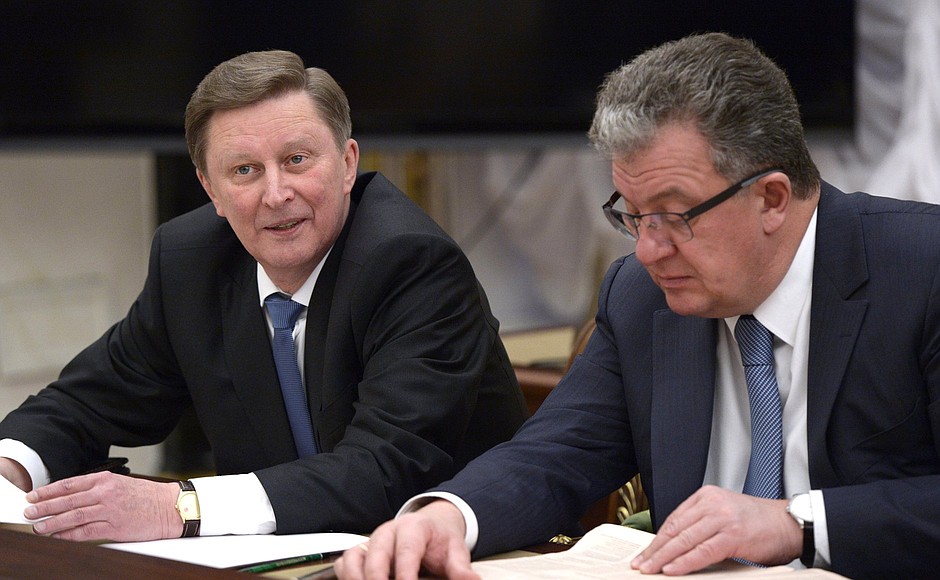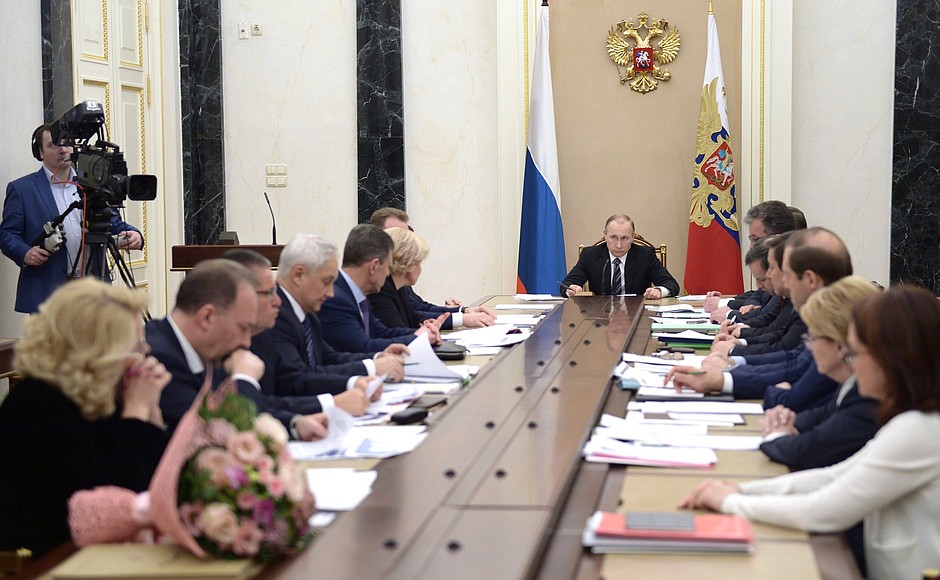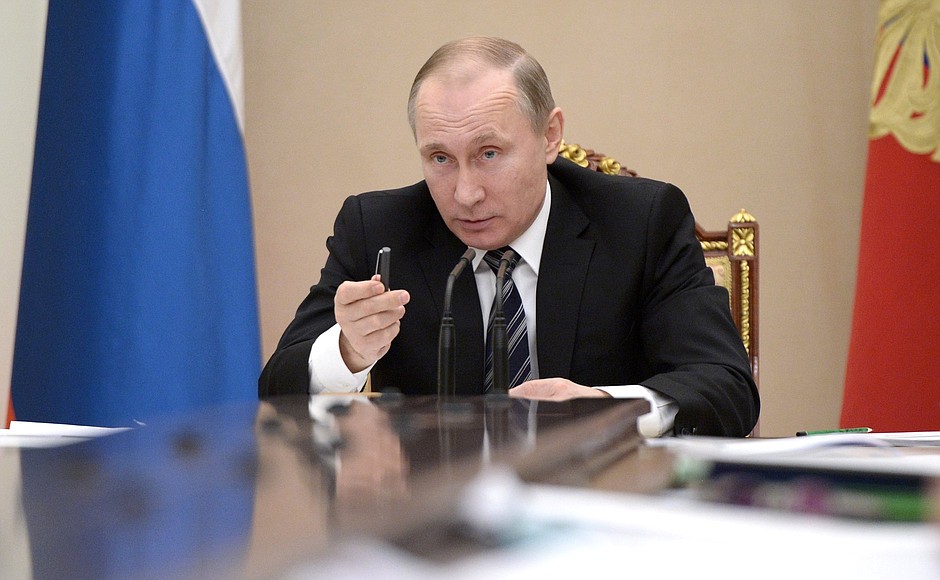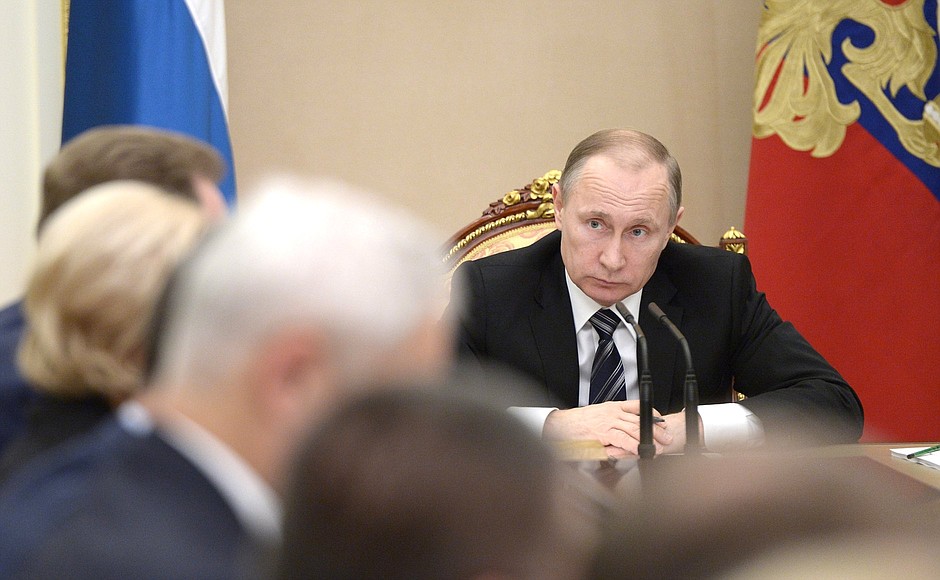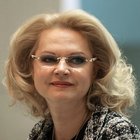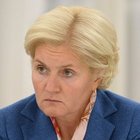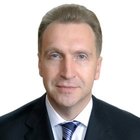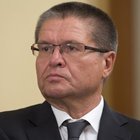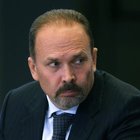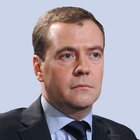Other items on the agenda included provision of medicines, support measures for single-industry towns, the public procurement system’s work, access for small and medium business to public procurement contracts, and carrying out the programme for resettling people out of dilapidated housing.
* * *
President of Russia Vladimir Putin: Colleagues, today is Ms Golikova’s birthday. Let’s all wish her a happy birthday.
I would like to present you with a book. Granted, it is from 1936, but we do not need to draw any historical parallels. Why? Because this is a classic opus, yet it corresponds with your work today. I imagine it will be useful to remember some of it. It is called the Government Inspector, by Nikolai Gogol.
Accounts Chamber Chairperson Tatyana Golikova: Thank you, Mr President.
Vladimir Putin: Colleagues, today we will discuss the Government’s action plan aimed at ensuring stable socioeconomic development in 2016. Mr Ulyukayev, Economic Development Minister, will give a report.
First, a few words on current issues. I suggest we begin with the highly sensitive, acute issue of the pharmaceuticals supply system. It is no secret that we are fixing price growth for many positions, including vitally important pharmaceuticals. Ms Golodets, if you will.
Deputy Prime Minister Olga Golodets: Mr President, first, some general figures.
Last year, the Russian pharmaceuticals market was worth 987 billion rubles, of which Russian medicines accounted for 28 percent monetarily, and 58 percent in physical terms of quantity.
It was very important to us for the import substitution programme to truly work, and last year, we had 24 percent growth in the pharmaceuticals sector. We fully covered Russia’s needs for flu vaccines, which played an important role this year in terms of limiting the flu epidemic.
It is very important that our medicines are successfully advancing on the global market as well. In 2015, the total export volume was $600 billion. For certain diseases, Russian pharmaceuticals dominate the niche globally. For example, the yellow fever vaccine, which our producers supply to the World Health Organisation, fully covers global demand.
Today, we have the highest requirements for the production and supply of pharmaceuticals to consumers. Thus, the list of vitally important medicines has been reviewed recently, with truly great care. On the one hand, we want all modern medicines to end up on this list in a timely manner. On the other hand, we are really incentivising Russian manufacturers so that they also hold an important place on that list.
We have noted that over the past year, costs of vitally important medicines, whose prices are regulated by the state, grew by 8.8 percent. Lately, a truly complicated situation has arisen in the price segment below 50 rubles.
Vladimir Putin: It is important that it does not get washed out entirely.
Olga Golodets: We understand all the risks; we held a big meeting with participation by the manufacturers. Right now, instructions have been given, and the Healthcare Ministry and Industry and Trade Ministry are developing mechanisms to support manufacturers in order to truly stimulate and support the manufacturers who participate in producing accessible, high-quality, inexpensive medicines.
We are noting that there is a very wide range in pricing for certain medicines. Take Fluconazole, for example. The cheapest Russian medicine costs 26 rubles, while the most expensive one, a French drug that has the exact same chemical formula, costs 655 rubles. Today, it is very important to disseminate information that this medicine has the same effect and at the same time, take all measures to provide corresponding regulation so that state retail chains take price into account when they purchase medicines.
Such measures are being prepared as well, and specific suggestions will be put together by February 12 on simplifying purchases in the state retail sector for medicines from the list of vitally important and highly important pharmaceuticals, as well as medicines that are not on that list.
We had truly feverish demand for flu medicines due to the flu epidemic; we had problems and disruptions. We got services involved that were working actively with manufacturers, suppliers and distributers. The situation is getting better and as of today, we see that indeed, medicines are starting to be delivered to pharmacies and we are closing the gaps we had at the end of last week. So we are working to maintain the situation at a good level.
Vladimir Putin: I would very much like for winter not to take us by surprise, and for the flu epidemics, which are also forecast by the WHO and our own services, not to appear out of the blue. After all, we understand what is happening, and we need to be ready for it. Right now, you are saying that the medicines are arriving, but the epidemic is nearly over. So I am asking for the future: all corresponding services should be fully mobilised and prepared for any new development.
Mr Shuvalov, at the end of January, a conference was held with participation by heads of municipalities in single-industry towns. What issues did it address?
Deputy Prime Minister Igor Shuvalov: Mr President, colleagues,
The Government has been working on the issue of single-industry towns since 2009. At the time, we understood that this is truly a challenge for us, because many town-forming enterprises found themselves at the brink of bankruptcy. So we worked actively on this matter, especially during the crisis period of 2009–2011. Projects were carried out worth 24 billion rubles, leading to the creation of 108,000 new jobs.
Given the events of the past year, the situation in many single-industry towns has also begun to deteriorate. In some of them, unemployment grew more than the average in their region, and these were often older companies dating back to the Soviet economic system. They are experiencing difficulties in marketing their products.
Together with the Fund you instructed us to create – Vnesheconombank’s Single Industry Town Development Fund – we organised a conference where we invited all 319 mayors and CEOs of town-forming enterprises (we have 319 of them, according to the methodology adopted by the Government, based on the World Bank’s methodology). In total, over 400 people participated in our conference.
We provided an advance opportunity for seven groups represented by different single-industry towns to train at our Skolkovo business school, to study the problems these enterprises are experiencing and search for various options of how to develop these cities and enterprises, how to develop the social spheres there and whether there are any prospects for these cities.
Seven projects were presented at the conference; their viability was justified in the presence of other heads of towns and settlements. This work was quite complicated, but everyone learned a great deal in the process of presenting the results of this work.
Two federal ministers spoke at the conference: Labour Minister Maksim Topilin and Industry and Trade Minister Denis Manturov. They presented our budgetary options, which the Government worked on in the past and will continue to work on, in order to support the labour market and specific industries.
The heads of two state corporations also made presentations, as well as Pyotr Fradkov, First Deputy Chairman of Vnesheconombank and Director General of the Russian Export Centre, who addressed the topic of export opportunities: how we will support small, midsize and large companies in their operations to sell their goods on foreign markets.
(Mr Shuvalov went on to talk about the results of the conference and proposal presented there.)
Overall, Mr President, the situation turned out to be quite interesting; it is more interesting than it appeared in the dry official documents. We had full immersion through in-person communication over the course of two days; all the ministers were working onsite, we simply lived those two days together. I want to say again that with all the difficulties we are experiencing, there are many trained professionals who are ready to resolve these problems.
Vladimir Putin: Please continue to help them.
Igor Shuvalov: We will.
Vladimir Putin: Today is February 10, and we can already summarise the 2015 state purchasing campaign. The overall scope in 2015 was quite large – more than 8 trillion rubles. We also spoke of the need to ensure access to state purchasing for small and medium-sized businesses. Mr Ulyukayev, what has been done in this area?
Economic Development Minister Alexei Ulyukayev: Mr President, colleagues,
We can say that state purchasing as a system has been a success. From a practical standpoint, one can probably say that 2015 was the final stage of these efforts. Indeed, we have more than 8 trillion rubles worth of contracts, which exceeds the gross domestic product by 10 percent. More than 500,000 suppliers are operating within this system, and 330,000 state and municipal customers are placing orders within the system, which ensures openness, transparency and efficient purchasing, covering the entire cycle from the statement of need and planning to selecting contractors and executing contracts.
We gave special attention to such matters as regulating purchasing and the creation of a single information system, which was launched on January 1, 2016. As for regulating purchasing, though limited for now, it applies to four basic items that cover the purchasing of automobiles, furniture, office equipment and means of communication for state and municipal needs, so we already have some initial experience.
In terms of efficiency, first of all we can see a strong interest and trust in the state purchasing system. As a rule, a slowdown in economic activity in the country is usually accompanied by a reduction in trade, and we can see this happening with private companies. However, the opposite is true of state purchasing. This means that transparency and efficiency have been proven in practice.
Now just a couple of figures. The first applies to cost cutting. We believe that roughly a 7-percent cut of the initial quote gives us some 320 billion rubles. Thus, almost 0.5 percent of the GDP has been saved through the efficiency and transparency of the purchasing system.
You have just mentioned small businesses. Yes, we have amended the law by adding mandatory quotas for small businesses. Last year purchases from small and medium-sized businesses were worth about 490 billion rubles, which is almost 50 percent more than in 2014. This is a significant result. This does not, of course, cover the entire quota, but we have made a large step in that direction.
Now regarding our current actions. I believe we have two main challenges: the first is to digitise everything, which would rule out corruption risks, or would at least strongly minimise them in state purchasing; the second is to apply a system of catalogues, listing services and prices, which would be the first step towards a system of reference prices. As you may remember, we spoke about this during your meeting with core members of the Popular Front – a lot was said about rates, when similar goods could be purchased in different regions at different rates. To avoid this, in 2016 we intend to launch a single catalogue of goods and services along with a library of standard contracts that would also help standardise the procedures, thus avoiding deviations from the basic rates.
I believe this work is quite successful and has received international acclaim. The World Bank has noted in its ratings that we are quite advanced internationally, and we have the feedback from the participants in state purchasing, the companies involved.
Vladimir Putin: You have to carry on and ensure access for small and medium-sized businesses to this purchasing.
<…>
Vladimir Putin: There is another programme that is of great importance for both the economy and the social sphere. This is the programme to resettle residents from housing that is unfit for living.
Mr Men, what was done last year and what are your plans for this year? A far as I understand, the 2015 programme is almost completed – by more than 98 percent. I would like you to tell us about your major achievements and the obvious flaws or setbacks, or maybe simply inability to solve the problems facing certain regions.
Construction, Housing and Utilities Minister Mikhail Men: Mr President, colleagues,
The programme was launched in 2008. In 2014, we had a breakthrough, resettling almost three times more people than in the previous years. The plans for this year are similar. According to the latest data, overall 2.78 million square metres of dilapidated housing have been vacated nationwide – this is 100.8 percent, with 174,500 people moving to new flats, which is 98.2 percent of the plan. Currently paperwork is being completed on another almost 100,000 square metres of housing and some 6,200 people are to move in.
We managed to achieve this by both relaxing the terms for the regions for joining the programme and enhancing regional responsibility. Thanks to your support, we reduced regional co-financing from 62 percent to 41.9 percent, thus making regional co-financing lower than in the previous years. Then we minimised the conditions for federal support, while application processing time has been reduced threefold. At the same time, we introduced rather strict financial liability for the regions failing to meet deadlines and submitting unreliable reports to the federal Government.
We have launched a multi-stage system of quality control for new housing, because quality is coming to the fore as well. Today we make sure construction is carried out in full compliance with the design and cost estimates that received an expert assessment – unfortunately, this was not done in the past because this mainly concerns low-rise buildings. As of the end of last year, this has been made law. We also introduced mandatory inspections by regional housing experts prior to commissioning to reveal any flaws, and then the houses are subject to an approval procedure by a commission involving public organisations, including a special public organisation for public control in housing and utilities.
We have also set up a federal and regional commission to consider and verify all complaints regarding the quality of new housing. The overall number of flaws is about 1 percent of the total housing built, but we are nevertheless keeping an eye on it. We have a special list of such stock, we receive information from Popular Front activists and from other public organisations, and we have a hotline, with the relevant telephone number indicated on every newly built house, so people know where to report any flaws they find.
(Further, the Minister gave detailed information on the implementation of the programme in the regions. There was a discussion of the causes for setbacks in this area in some regions. Mr Men said the biggest slippages were in the Republic of Karelia and the Trans-Baikal Territory)
Vladimir Putin: Mr Medvedev, I have a request to you and the Chief of Staff of the Presidential Executive Office. I would like to see an additional analysis of what is going on in the regions that are lagging behind and proposals, including those regarding personnel.
Prime Minister Dmitry Medvedev: Yes, Mr President, we will do that.
Vladimir Putin: Good, thank you.
Nevertheless, we need to carry on with this programme and make sure it is implemented consistently throughout the Russian Federation.
<…>
